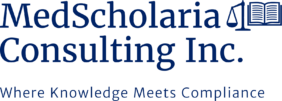
The future of healthcare depends on value-based care—and nurses are the critical, yet often overlooked, drivers of that transformation. As the U.S. shifts toward accountable care models and artificial intelligence (AI) continues to reshape clinical decision-making, a major gap remains in how we educate and prepare nurses for roles in Utilization Management (UM) and healthcare technology integration.
That’s where Medscholaria Consulting, Inc. comes in.
The Problem: Undertrained Nurses in High-Impact Roles
Utilization Management is central to controlling healthcare costs, improving outcomes, and streamlining access. Yet, most nurses have little to no exposure to UM during their education—and even fewer understand how AI is changing the landscape.
This gap is not trivial. A 2024 study in BMC Nursing found that a significant percentage of hospital days after colorectal cancer surgery are clinically unnecessary, often due to unclear discharge protocols or lack of structured decision-making tools. Similarly, cross-country analysis from the American Journal of Economics and Sociology demonstrates that avoidable hospital admissions correlate strongly with weak primary care governance and poor systemic support for evidence-based decisions.
UM nurses have the potential to close these gaps—but only if they are trained to lead.
Medscholaria’s Unique Solution
Medscholaria Consulting is a California Board of Registered Nursing-approved CE provider (CEP 18046) delivering online, self-paced courses that focus specifically on:
- Utilization Management fundamentals
- Artificial Intelligence integration in nurse decision-making
- Healthcare policy, payer collaboration, and value-based care
- Compliance and documentation aligned with CMS and payer expectations
Our flagship course, “The Role of AI in Utilization Management“, offers 3 contact hours and explores how AI is being adopted in UM, including benefits, risks, and the ethical challenges posed by opaque algorithms. It’s followed by our second course, “Getting Started in UM: Tools, Trends, and Opportunities“, which introduces the practical tools and pathways into UM roles for nurses.
Impact-Driven Education
What sets Medscholaria apart?
| Feature | Medscholaria Consulting | Typical CE Providers |
| Focus | UM, AI, health policy, and system reform | General clinical refreshers |
| Target Learner | RNs exploring or transitioning to UM, CM, or admin roles | Broad nurse audience |
| Curriculum | Evidence-based + guideline-integrated (MCG®, InterQual®) | Often lacks payer or tech focus |
| Value Proposition | Aligned with CMS’s national priorities on cost, access, and equity | License renewal compliance |
| Access | Affordable, scalable, 100% online | Often expensive and limited to in-person sessions |
Data-Driven Justification: Why This Matters Now
The real-world cost of ineffective care and avoidable hospitalizations is staggering:
- A recent global study found avoidable hospital admissions for chronic conditions such as diabetes and COPD vary up to 9x between countries, depending on how well primary and preventive care—including UM—is implemented.
- In surgical settings, ineffective hospital days (IHDs)—where patients stay unnecessarily due to non-clinical delays—affect up to 17.1% of colorectal cancer cases and directly raise costs while reducing care quality.
UM nurses, when trained properly, can help flag unnecessary inpatient days, prevent redundant testing, and streamline care planning—saving money while improving outcomes.
Our National-Level Impact
Medscholaria doesn’t just educate—it advances the strategic goals of the U.S. healthcare system, including:
✅ Reducing Waste
UM-trained nurses equipped with AI and policy insights can prevent unnecessary procedures and reduce ineffective hospital stays.
✅ Empowering Non-Clinical Career Paths
By offering a clear roadmap into UM, Medscholaria helps nurses transition into high-demand, non-clinical roles that reduce burnout and expand workforce capacity.
✅ Supporting CMS Value-Based Care Goals
Our courses teach nurses to understand and support national metrics like hospital readmission reduction, equitable access, and population-level quality initiatives.
Looking Ahead
Our goal is to scale to 10,000 nurses over the next 24 months and partner with ACOs, managed care organizations, and post-acute providers to embed UM training into onboarding and quality programs.
We believe that by equipping nurses with the skills to work at the intersection of clinical care, technology, and policy—we can accelerate healthcare transformation from the inside out.
Join the Movement
If you’re a nurse ready to grow beyond the bedside, a policymaker looking to scale workforce impact, or a healthcare leader needing practical training for your team—Medscholaria is your strategic partner.
Visit medscholaria.com to explore our courses or connect directly with our team.
Provider approved by the California Board of Registered Nursing, Provider #CEP18046.
References
Bureau of Labor Statistics. (2023). Occupational outlook handbook: Registered nurses. U.S. Department of Labor. https://www.bls.gov/ooh/healthcare/registered-nurses.htm
Centers for Medicare & Medicaid Services. (2023). CMS Innovation Center strategy refresh: Driving accountable care. https://innovation.cms.gov/strategic-direction-whitepaper
Magalhães, J. P., Pestana, J., Silva, R. L., Pereira, A., & Biscaia, A. (2023). Avoidable hospital admissions depend on the primary healthcare governance model? A global health perspective from Europe countries. American Journal of Economics and Sociology, 82(3), 675–696. https://doi.org/10.1111/ajes.12523
Sun, J., Zhang, Q., Ma, J., Wang, D., Zhang, L., He, L., Sun, X., Guo, Y., Zhao, Y., Xing, Y., Hu, H., & Wang, Q. (2025). Development of an evaluation index system for inappropriate hospital admissions after colorectal cancer surgery in the context of enhanced recovery after surgery. BMC Nursing, 24(154). https://doi.org/10.1186/s12912-025-02777-8
